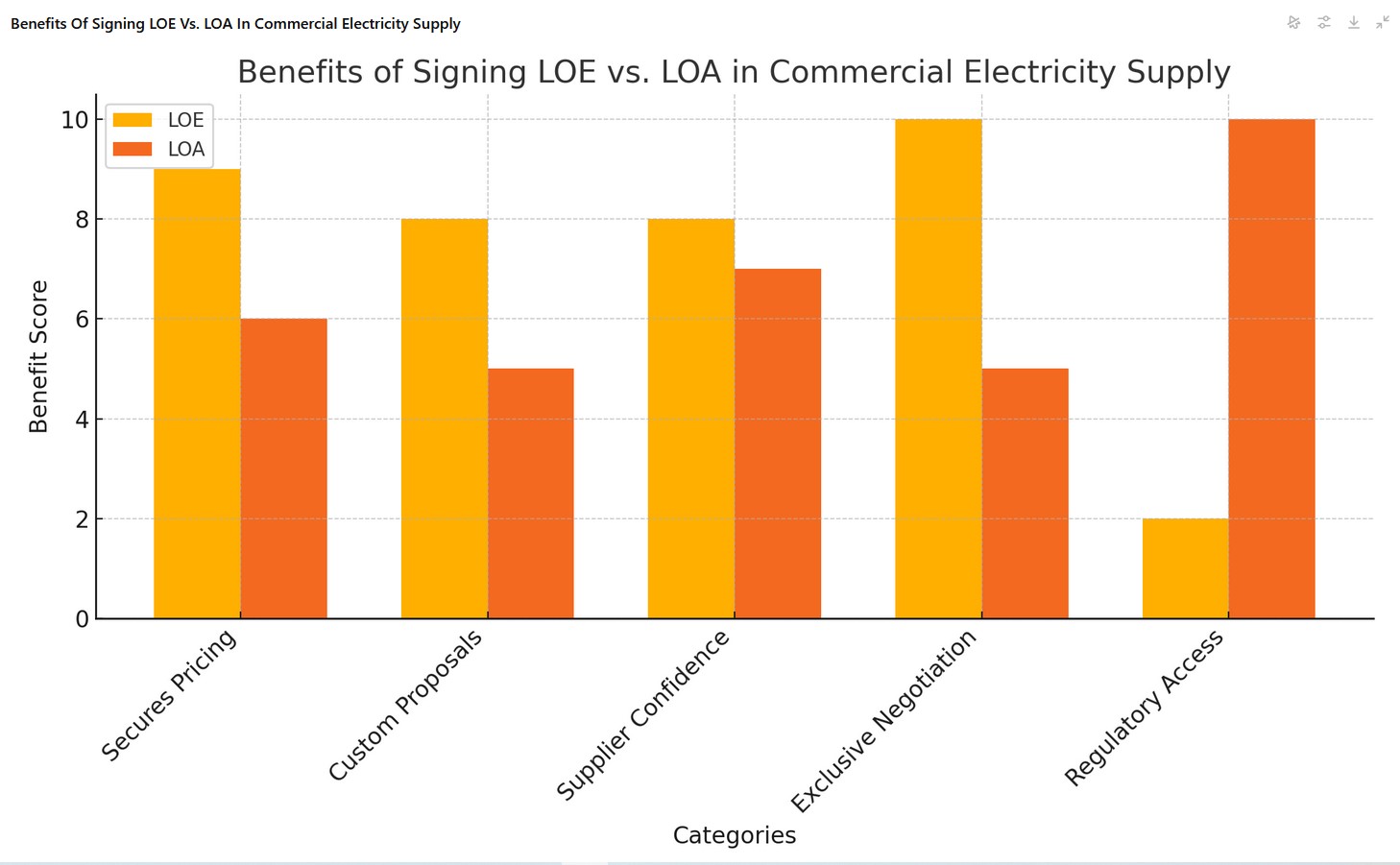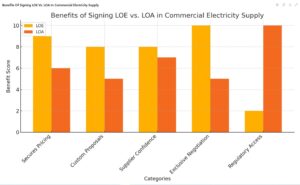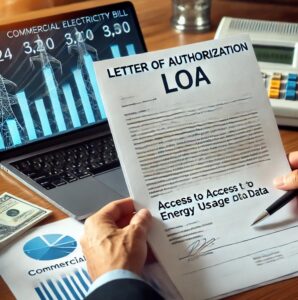LOA vs LOE

This chart compares the benefits of signing a Letter of Exclusivity (LOE) versus a Letter of Authorization (LOA) in the context of commercial electricity supply.

Key Differences:
- LOE (Letter of Exclusivity):
- Purpose: A customer commits exclusively to one supplier or broker for a period of time. This agreement encourages suppliers to offer the best possible rates and tailored solutions.
- Key Benefits:
- Secures Pricing: Suppliers provide more competitive rates because they know they are dealing exclusively with one customer.
- Custom Proposals: Tailored energy solutions are created with the customer's unique energy needs in mind.
- Supplier Confidence: Suppliers are more likely to invest time and resources since they have a high likelihood of securing the contract.
- Exclusive Negotiation: Simplifies the process and focuses the discussion on one supplier, making negotiations clearer and more effective.
- LOA (Letter of Authorization):
- Purpose: This authorizes a supplier or broker to access the customer’s energy usage and other confidential data. It allows suppliers to gather relevant information to provide accurate quotes.
- Key Benefits:
- Regulatory Access: Allows the supplier to access the customer’s energy data and historical billing information.
- Supplier Confidence: It signals that the customer is serious about gathering quotes but does not guarantee exclusivity like an LOE.
Why You May Need to Sign Both:
- LOA: Grants a supplier access to important energy data needed to generate an accurate quote.
- LOE: Ensures that the customer is negotiating exclusively with one supplier for a specific period, encouraging more competitive pricing and custom solutions.
In some cases, a customer may sign both to ensure they get accurate data-driven quotes (via LOA) and receive the best pricing and proposals (via LOE)
______________________________________________________________________
What is an LOE?
An LOE (Letter of Exclusivity) is a document that commercial customers sign when comparing energy suppliers. It is often required in competitive energy markets, such as those with deregulated electricity, where multiple suppliers are vying to offer the best rates and services. Here's why a customer would need to sign an LOE and how it can help with suppliers: An LOE is a formal agreement between a customer and an energy supplier or broker, stating that the customer will not engage in discussions with other suppliers for a specified period. In return, the energy supplier or broker provides the customer with detailed pricing, customized proposals, and other contractual benefits. It typically lasts for a set timeframe, during which the supplier or broker can offer exclusive rates based on the customer's specific energy needs.

Why would a customer need to sign an LOE?
- Access to Competitive Pricing: By signing an LOE, the customer signals their commitment to seriously considering a supplier's offer, which often leads suppliers to provide more competitive rates. It can encourage suppliers to offer better pricing since they know they are not competing with others during the agreed period.
- Customized Energy Solutions: When a customer signs an LOE, the supplier can invest time in creating tailored energy solutions, such as a blend of fixed and variable pricing or long-term contracts. These customizations might require significant analysis, and an LOE ensures that the supplier's efforts are focused on a likely contract.
- Streamlined Negotiations: An LOE simplifies the negotiation process. Instead of entertaining multiple suppliers and dealing with potentially conflicting offers, the customer focuses on one supplier at a time, allowing for clearer communication and a more efficient decision-making process.
- Supplier Confidence: Energy suppliers often request an LOE because it gives them confidence that the customer is committed to the negotiation process. This confidence may result in better terms, more flexibility in contracts, and added services like energy audits or demand response programs.
How can an LOE help with suppliers?
- Ensures Dedicated Attention from Suppliers: Suppliers know that during the LOE period, they have a high likelihood of securing the contract, so they are more likely to allocate dedicated resources and effort to the customer's account.
- More Favorable Contract Terms: The exclusivity granted by the LOE encourages suppliers to offer additional perks, such as extended payment terms, better contract flexibility, or renewable energy options, to win the customer’s long-term business.
- Reduces Rate Volatility: An LOE can lock in more favorable rates for the customer by enabling the supplier to hedge their energy purchasing in a more predictable manner. Since suppliers know they will likely secure the contract, they can plan their procurement strategies better, often leading to lower rates.
- Access to Confidential Pricing Information: Some suppliers only share their most competitive rates after receiving an LOE to ensure that their offers are not simply being used to bargain with competitors. Signing an LOE can provide access to this exclusive pricing.
Today in the context of commercial electricity supply, signing an LOE helps the customer by fostering trust, securing competitive pricing, and simplifying the process of choosing a supplier. It benefits suppliers by ensuring that their efforts in preparing offers and solutions are likely to result in a contract. The LOE is a useful tool in the energy procurement process, creating a structured and focused negotiation.
______________________________________________________________________________________________
What is an LOA?
A Letter of Authorization (LOA) is a document that a customer signs to grant permission for an energy supplier or broker to access specific information about their energy usage and historical billing data. This access allows the supplier to gather all the necessary data to generate accurate price quotes and energy proposals tailored to the customer’s needs. Here's why a customer would need to sign an LOA and how it helps with suppliers: An LOA is a legal authorization that enables an energy supplier, broker, or third party to request and access the customer’s utility account details, including past energy usage, billing history, and other relevant data. This document is crucial when shopping for commercial electricity because it ensures that the supplier has the accurate data needed to offer appropriate pricing.

Why Would a Customer Need to Sign an LOA?
- Access to Accurate Energy Data: Signing an LOA allows the supplier to obtain accurate, real-time information on the customer’s energy consumption. This data includes monthly usage, peak demand, load factor, and other consumption patterns necessary to offer customized pricing.
- Tailored Energy Proposals: Without the LOA, suppliers would only be able to give rough estimates or generic pricing. With an LOA, they can create customized proposals, offering the customer more relevant rates based on their specific energy profile, which could lead to better pricing and contract terms.
- Simplified Data Collection: Signing an LOA simplifies the data collection process for both the customer and the supplier. Instead of the customer manually gathering energy bills or consumption data, the supplier can directly request this information from the utility provider, making the process more efficient.
- Eligibility for Specific Rates and Offers: Many suppliers have specialized rates based on consumption patterns, such as time-of-use rates, peak demand pricing, or volume discounts. An LOA enables suppliers to determine which of these rates the customer may be eligible for by reviewing their energy usage profile.
How Can an LOA Help with Suppliers?
- Accurate Quotes: By signing an LOA, the customer ensures that any quotes received from suppliers are based on actual energy usage data rather than estimates, leading to more accurate and fair pricing.
- Better Contract Terms: With a clear understanding of the customer’s energy profile, suppliers can offer better contract terms, such as fixed rates or tailored products that reduce exposure to market volatility.
- Transparency in Pricing: An LOA gives suppliers the opportunity to analyze how much energy the customer consumes and when it is consumed. This transparency helps suppliers offer more competitive and transparent pricing options, potentially saving the customer money.
- Streamlined Process: The LOA streamlines the entire comparison process, reducing the time it takes for suppliers to gather information and present quotes. This can accelerate decision-making for the customer, especially when time is a critical factor.
Today a Letter of Authorization (LOA) is essential for obtaining accurate and tailored electricity supply proposals. By granting access to detailed energy usage and billing history, the LOA ensures that the customer receives precise pricing and contract offers that are based on their actual consumption patterns. This transparency and accuracy ultimately help the customer compare energy suppliers more effectively and make an informed decision about their commercial electricity supply.
